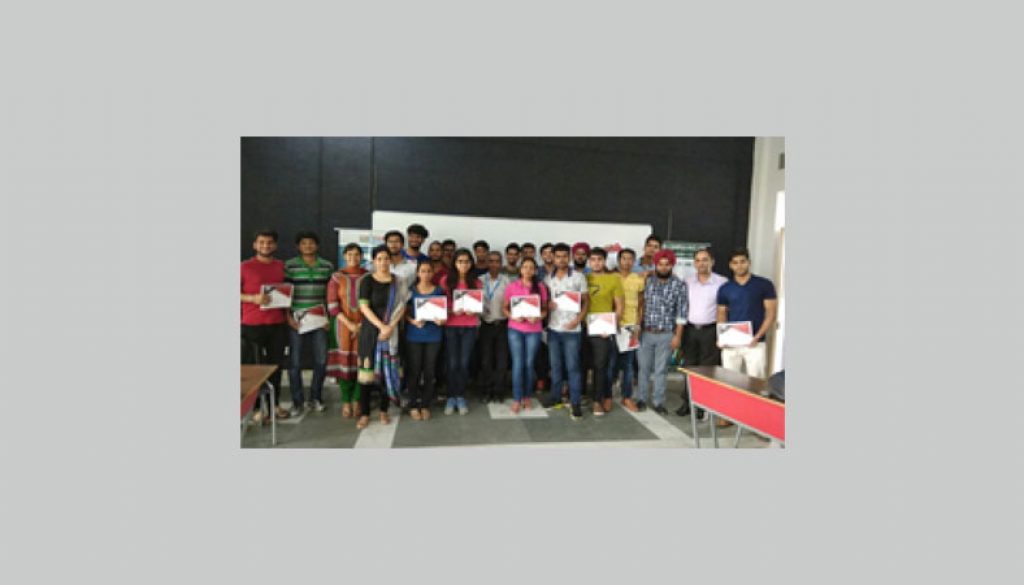Summer Training-June 2017 Department Of Electronics & Communication, MRU Faridabad
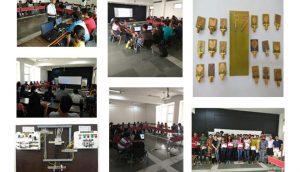 Department of Electronics & Communication organizes various Workshops on continuous basis to enhance practical & technical skill set of students and to make them compatible with industry. To fulfill industry need, Electronics & Communication Department has organized following modules/workshops during summer training 2017.
Department of Electronics & Communication organizes various Workshops on continuous basis to enhance practical & technical skill set of students and to make them compatible with industry. To fulfill industry need, Electronics & Communication Department has organized following modules/workshops during summer training 2017.
- PCB and Circuit Designing in association with CROMA CAMPUS.
- Analytical Solutions of Electronic Components using Matlab.
- Projects like Line Follower, Obstacle Detector, Fingerprint Sensing using Arduino.
- Image Processing using Matlab.
- Designing Multi-Band Antennas using HFSS simulation tool.
- CCNA Module
- Automation using Programmable Logic Controllers (PLC Ladder Logic)
- One Week Workshop on “PCB and Circuit Designing”
- PCB and Circuit Designing in association with CROMA CAMPUS:
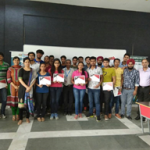 PCB Designing is one of most emerging field in Electronics in today’s era. PCB designers are key personnel in Research and Development (R&D), electronics production units as well as in the PCB industry. The workshop was aimed to provide knowledge about simulation tools to design and simulate electronics circuits. PCB design software titled Cad soft EAGLE & Proteus were provided to students for hands on.Following content are covered in workshop:
PCB Designing is one of most emerging field in Electronics in today’s era. PCB designers are key personnel in Research and Development (R&D), electronics production units as well as in the PCB industry. The workshop was aimed to provide knowledge about simulation tools to design and simulate electronics circuits. PCB design software titled Cad soft EAGLE & Proteus were provided to students for hands on.Following content are covered in workshop:
(1) Schematic Design , (2) Component Footprint Design, (3) Integrated Library Design (4) PCB Design & Routing.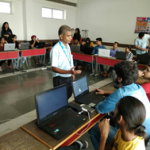 Ms. Yogita Khanna, Ms. Samta, Mr. Bhanu Pratap (Manav Rachna University, Faridabad) & Mr. Prateek Sharma (CROMA CAMPUS) have coordinated one week PCB Design workshop. The resource person from CROMA CAMPUS, Mr. Srikantan holds 30 years of experience in PCB industry. He shared his significant industrial experience to enhance student’s skill level. After attending this workshop students are capable of designing special purpose PCB for various Electronics Project.
Ms. Yogita Khanna, Ms. Samta, Mr. Bhanu Pratap (Manav Rachna University, Faridabad) & Mr. Prateek Sharma (CROMA CAMPUS) have coordinated one week PCB Design workshop. The resource person from CROMA CAMPUS, Mr. Srikantan holds 30 years of experience in PCB industry. He shared his significant industrial experience to enhance student’s skill level. After attending this workshop students are capable of designing special purpose PCB for various Electronics Project. - Analytical Solutions of Electronic Components using Matlab:
In this module, characteristics of Electronic devices were realized. All the derived results of respective device characteristics were plotted using Matlab tool with the help of mathematical equations. Further enhancing the same, device level simulation was performed on Simulink tool. Mr. Anand Singh & Mr. Lokesh Bhardwaj have prepared & systematized this Module so that students are able to analyze the Electronic devices using Matlab. - Projects like Line Follower, Obstacle Detector, Finger Print Sensing using Arduino:
Arduino workshop of 40 hours was conducted for ECE students. Students were given hands on training with small modules and projects using Arduino Uno and thereafter, groups choose their projects (Obstacle detector, Robotic hand, Line follower Robot with PID controller, LED cube matrix). For their respective projects students made their hardware design and programming. Mr. Vijay Gill & Ms. K Deepa have facilitated students for various projects and guided them for the hardware as well as the programming. - Image Processing using Matlab:
A short term course on “Digital Image Processing “was conducted for the students the Department of ECE, MRU. The course focused on the fundamentals of Digital image processing techniques. The course covered the topics starting from the image representation, uses of image processing, applications of image processing etc. Different types of image representation formats and their significance, spatial and frequency domain techniques of image enhancement, image restoration etc were covered. The concepts of audio signal processing were also introduced. It included the production, representation of audio signals, and visualization of signals in time and frequency domain. The synthesis of audio signals using various filtering techniques was carried out.
Video processing concepts were also introduced. All the concepts and techniques were realized using Digital Image and sound processing toolbox in MATLAB. Minor project on vehicle identification and face detection were also implemented. The participants participated in the course with great enthusiasm and few of them showed their interest in continuing further to develop major projects in future. Dr. Charu Pathak has structured this Module using Matlab. - Designing Multi-Band Antennas using HFSS simulation tool:
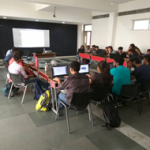 The objective of this summer training was to acquaint the ECE students with the principles, developments and research trends in the area of microwave, antennas and propagation. The summer training had covered the perfect combination of theory and practical sessions in the well balanced manner. This work will certainly help students to improve technical skill set and hence employability quotient. This will also help them to explore the field of microwave and antennas for finding new possibilities of development in the field.
The objective of this summer training was to acquaint the ECE students with the principles, developments and research trends in the area of microwave, antennas and propagation. The summer training had covered the perfect combination of theory and practical sessions in the well balanced manner. This work will certainly help students to improve technical skill set and hence employability quotient. This will also help them to explore the field of microwave and antennas for finding new possibilities of development in the field.
Students have spent many extra hours working on the design aspects of antenna. The main contents of the course had been as follows:
(1) CAD-HFSS: Hands on Session, (2) GPS Antenna for Global Navigation Satellite System (GNSS) (3) Circularly polarized Antenna for GPS, (4) Multi-band Antenna (Penta &Hexa bands) (5) Antenna for Bluetooth.(1) CAD-HFSS: Hands on Session, (2) GPS Antenna for Global Navigation Satellite System (GNSS) (3) Circularly polarized Antenna for GPS, (4) Multi-band Antenna (Penta &Hexa bands) (5) Antenna for Bluetooth.
Dr. Y K Awasthi along with Ms. AnchalChugh, Ms. Yogita Khanna & Ms. Nitika have structured this module. Dr. Y K Awasthi has a vast experience in designing and implementing antenna for various practical applications. After this module students are able to design & simulate various multi-band Antennas. - CCNA module:
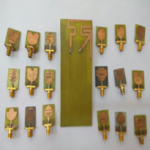 In this module students have gone through the basics of routers and switches that constitute the main elements of networking. After attending this modules, students are able to configure local networking with the help of static/dynamic routing, Telnet, VLAN as well as VTP/STP. Mr. Anuj Kumar has been the In-charge and also the resource person for this module.
In this module students have gone through the basics of routers and switches that constitute the main elements of networking. After attending this modules, students are able to configure local networking with the help of static/dynamic routing, Telnet, VLAN as well as VTP/STP. Mr. Anuj Kumar has been the In-charge and also the resource person for this module. - Automation using Programmable Logic Controllers (PLC Ladder Logic):
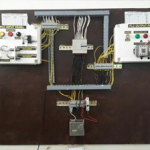 In this module, the basics of a PLC and its ladder logic programming was introduced to students. Students learned design tool and simulated the same in real time application on the PLC software , IDEC. Some of the applications designed are Automatic Car Parking System, Elevator Control System, Automatic Coffee Maker Machine etc. After the hands on the software efficiently, the students were introduced the Hardware of PLC available in Control Systems Engineering Lab, The laptops were interfaced with the hardware and then students checked all the applications designed by them physically on the hardware. Ms. Niharika Thakur conducted and facilitated the students to design PLC applications and helped in trouble shooting and problem solving.
In this module, the basics of a PLC and its ladder logic programming was introduced to students. Students learned design tool and simulated the same in real time application on the PLC software , IDEC. Some of the applications designed are Automatic Car Parking System, Elevator Control System, Automatic Coffee Maker Machine etc. After the hands on the software efficiently, the students were introduced the Hardware of PLC available in Control Systems Engineering Lab, The laptops were interfaced with the hardware and then students checked all the applications designed by them physically on the hardware. Ms. Niharika Thakur conducted and facilitated the students to design PLC applications and helped in trouble shooting and problem solving.


